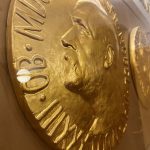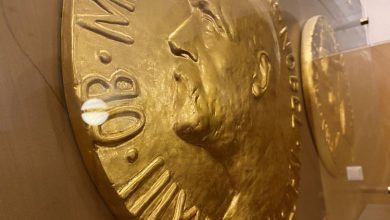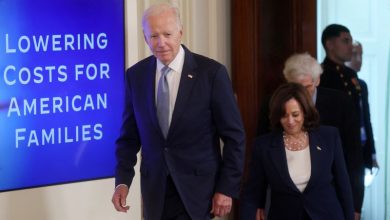Factbox-Previous winners of the Nobel Peace Prize
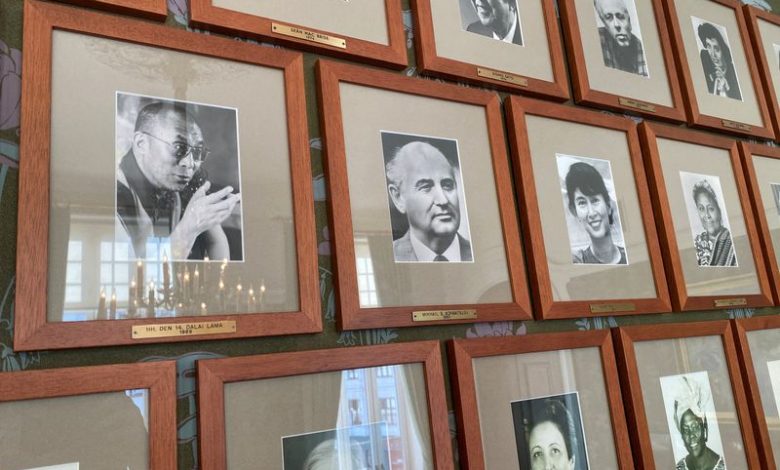
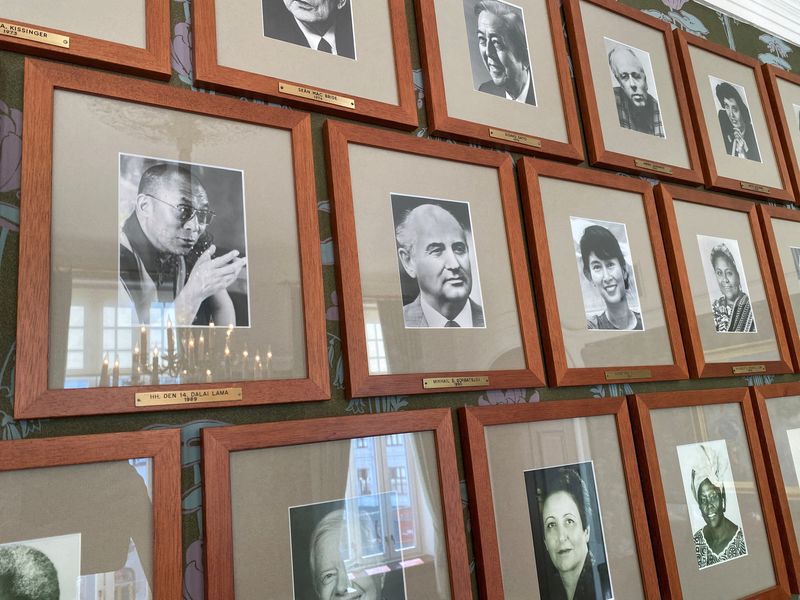
FILE PHOTO: Pictures of Nobel Prize laureates are displayed inside the Norwegian Nobel Institute in Oslo, Norway September 19, 2022. REUTERS/Victoria Klesty/File Photo
By Gwladys Fouche
OSLO (Reuters) – The winner of the 2023 Nobel Peace Prize will be announced on Oct. 6 in Oslo. Here are some past winners – and one person who did not but should have.
MARTIN LUTHER KING
The leader of the U.S. civil rights movement was “the first person in the Western world to have shown us that a struggle can be waged without violence,” according to the then chairman of the award body, Gunnar Jahn.
“He is the first to make the message of brotherly love a reality in the course of his struggle, and he has brought this message to all men, to all nations and races.”
At 35, he was also the youngest Nobel Peace Prize laureate at the time. Today the youngest winner is Pakistan’s education campaigner Malala Yousafzai, who was 17 when she won in 2014.
NELSON MANDELA
The Nobel Peace Prize has been controversial on many occasions but most agreed in 1993 that Mandela winning the award was “self-evident”, according to Geir Lundestad, the then secretary of the Norwegian Nobel committee.
Mandela spent 27 years in prison and still called for a peaceful transition to end apartheid in South Africa.
What was not self-evident was awarding the prize jointly with Frederik Willem de Klerk, the last white leader of South Africa, Lundestad said in his 2015 memoir.
Many said Mandela should have won alone, while others said Mandela could not make peace without a counterpart, recounted Lundestad. In the end, the prize was given to both to encourage the peaceful transition to a democratic South Africa, which was not completed by the time of the award.
HENRY KISSINGER AND LE DUC THO
Among the most controversial awards is the 1973 one to top U.S. diplomat Henry Kissinger and North Vietnam’s Le Duc Tho for reaching the January 1973 Paris Peace Accords under which Washington completed a military withdrawal from South Vietnam.
The Nobel committee’s decision shocked many at the time as Kissinger played a major role in U.S. military strategy in the final stages of the 1955-75 Vietnam war.
Le Duc Tho refused the prize on the grounds peace had not yet been established. Two of the five committee members resigned in protest.
Kissinger, while accepting the award, did not travel to Norway for the ceremony and later tried in vain to return the prize.
Internal documents released in January of 2023 showed the then committee gave the award in the full knowledge the Vietnam War was unlikely to end any time soon.
AUNG SAN SUU KYI
One of the few women to win the award, Suu Kyi was one of a string of human rights campaigners in the 1990s to receive the Nobel Peace Prize, for her non-violent struggle for democracy against the military dictatorship in Myanmar.
For years she was hailed as one of the best recipients of the award, but that changed after the Myanmar military carried out mass killings and gang rapes “with genocidal intent” according to a United Nations investigation.
Suu Kyi, who led the Myanmar government at the time, has been criticised for failing to speak out against the army crackdown against the Rohingyas.
In 2021, following a new military coup, Suu Kyi was arrested again. The 79-year-old is currently in jail and her health is ailing, according to her son.
MAHATMA GANDHI
He was on the committee’s internal discussion list of candidates on five different occasions, with the body prepared to award him in 1948, the year he was assassinated, according to Lundestad.
The committee could still have given it to him posthumously – it was possible at the time but no longer is – but did not.
According to Lundestad, it may be because the committee did not want to offend close ally Britain, the former colonial power in India, or because the politics of Gandhi may have been perceived as too “foreign” or “anti-modern” by members of a Europe-centric committee.
The violence of India’s partition could also have played a part, he said. At least one million people were killed and 15 million were uprooted.
In any case, “among the omissions, Mahatma Gandhi stands in a class of his own,” writes Lundestad in his memoir.
“It is of course extremely unfortunate that the 20th century’s leading spokesman for non-violence never received the Nobel Peace Prize.”


